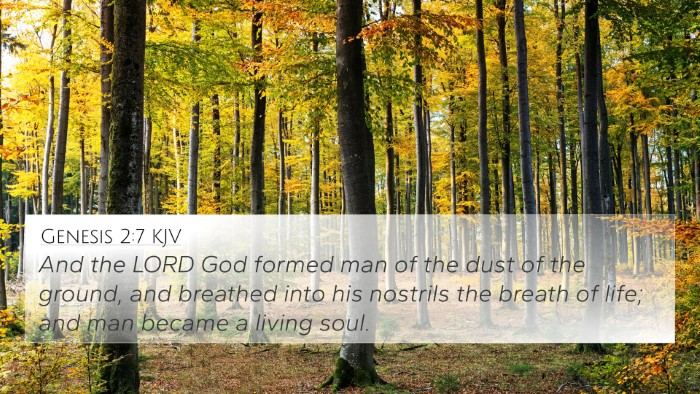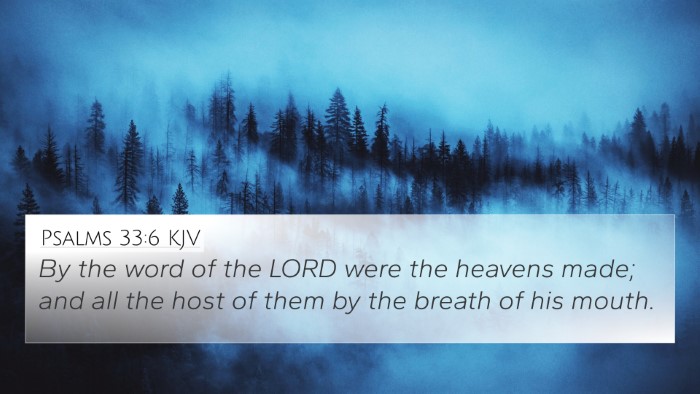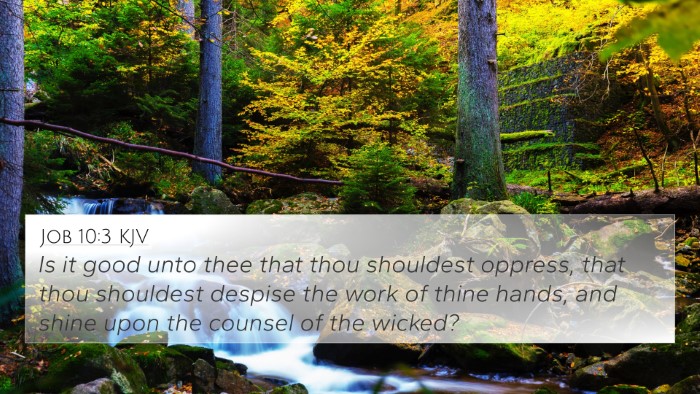Understanding Job 33:4
Job 33:4 states: "The Spirit of God has made me, and the breath of the Almighty gives me life." This verse is significant as it relates to the themes of creation, divine inspiration, and the essence of life itself, as illustrated in various public domain commentaries.
Key Insights from Public Domain Commentaries
-
Matthew Henry:
Henry elaborates on the phrase "The Spirit of God," emphasizing that it signifies the divine breath or the Holy Spirit that enlivens all creation. This points out God's role as the ultimate creator and sustainer of life, highlighting that human existence is directly connected to God's will and power.
-
Albert Barnes:
Barnes interprets this verse as affirming the source of human life. He notes that to understand our existence, one must recognize God's breathing life into humanity, which aligns with the creation narrative found in Genesis 2:7. This establishes a connection between Biblical texts regarding the origin and purpose of human life.
-
Adam Clarke:
Clarke emphasizes the significance of the "breath of the Almighty." He explains that this breath is not merely physical but symbolizes spirituality and purpose, as it is infused by God. This ties into the theme of divine providence and the idea that there is a divine intention behind every human life.
Connections and Cross-References
This verse presents several connections and cross-references within the Bible, providing a broader understanding of its implications:
- Genesis 2:7: "Then the LORD God formed the man from the dust of the ground and breathed into his nostrils the breath of life, and the man became a living being."
- Psalm 104:29-30: "When you hide your face, they are terrified; when you take away their breath, they die and return to the dust. When you send your Spirit, they are created, and you renew the face of the ground."
- Isaiah 42:5: "This is what God the LORD says—the Creator of the heavens, who stretches them out, who spreads out the earth and its blooms, and I give breath to its people, and spirit to those who walk on it."
- Ecclesiastes 12:7: "And the dust returns to the ground it came from, and the spirit returns to God who gave it."
- Job 32:8: "But it is the spirit in a person, the breath of the Almighty, that gives them understanding."
- John 20:22: "And with that, he breathed on them and said, 'Receive the Holy Spirit.'"
- Acts 17:25: "And he is not served by human hands as if he needed anything, rather, he himself gives everyone life and breath and everything else."
- Romans 8:26: "In the same way, the Spirit helps us in our weakness. We do not know what we ought to pray for, but the Spirit himself intercedes for us through wordless groans."
- 2 Timothy 3:16: "All Scripture is God-breathed and is useful for teaching, rebuking, correcting and training in righteousness."
- Revelation 11:11: "But after the three and a half days the breath of life from God entered them, and they stood on their feet, and terror struck those who saw them."
Thematic Analysis
The essence of Job 33:4 can lead to a thematic analysis across the scriptures:
- Creation and Existence: This verse highlights that creation is under God’s authority, connecting it to Genesis 1:26-27 where humans are made in God's image.
- Divine Inspiration: The concept of "breath" as divine inspiration can also be linked to the writing of the Scriptures, suggesting that the very words are alive because of God's Spirit.
- Understanding Life: The recognition that understanding life comes through the Spirit, as stated in Job 32:8, exemplifies the continuity in the understanding of the divine-human relationship.
- Hope of Resurrection: The continuity of God’s breath throughout the Bible indicates a hope of resurrection and life after death, as seen in Romans 8:11 where the Spirit of God raises the dead.
Cross-Referencing Guidance
For those studying Job 33:4, employing tools for cross-referencing can deepen understanding:
- Use a Bible concordance to locate similar mentions of 'spirit' and 'breath' across the scripture.
- Engage with a cross-reference Bible study guide to explore themes like life, death, and creation.
- Consider employing cross-referencing study methods that highlight the inter-Biblical dialogue between the Old and New Testaments.
Concluding Thoughts
The verse in Job 33:4 serves as a reminder of the divine origins of human life and the sustaining power of God's Spirit. By exploring cross-references and connecting them to other Biblical texts, one can appreciate the richness of the scriptures and their cohesive narrative about life, purpose, and divine interaction. Whether you’re engaged in personal study or sermon preparation, these references and insights can provide a deeper understanding of Biblical truth.










